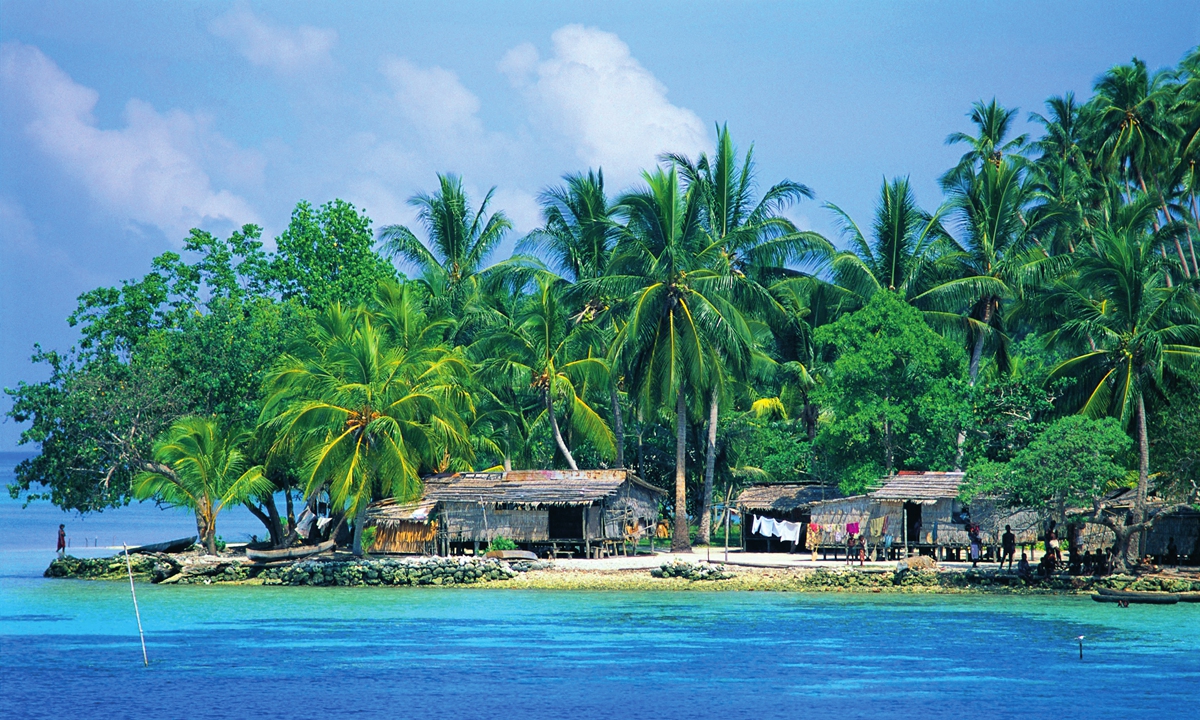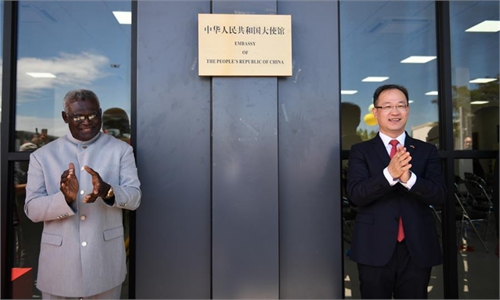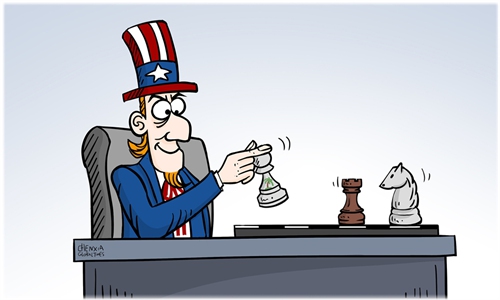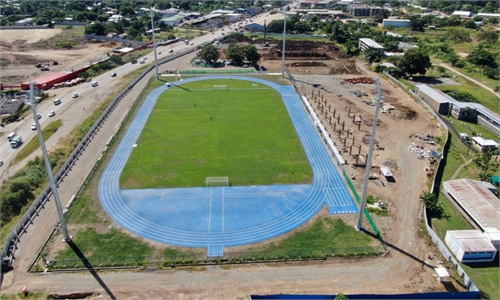Pointing fingers at China over Solomon Islands' suspension of foreign navies' visit shows Washington's deep insecurity: expert

Scenery of Solomon Islands Photo: IC
The US and Australia have stirred yet another round of hype over China's presence in the South Pacific region, including the fuss the US made after the Solomon Islands suspended port visits by all foreign military ships, and Australian foreign minister's visit to the South Pacific region to offset China's influence.
Observers said this not only reflects the two countries' colonial mentality of continuing to treat regional countries as their backyard, but their deep insecurity on ties with South Pacific nations.
On Tuesday, several US media outlets, including The New York Times and Bloomberg, reported that the Solomon Islands has suspended visits by US military vessels, and that this raises concerns that the Pacific nation is "turning away from engagement with US in favor of working with China," according to The New York Times.
The Solomon Islands government formally notified the US on Monday that it has placed a moratorium on all foreign military ship visits pending a review of protocols and procedures, Reuters quoted Vedant Patel, a deputy spokesperson for the US State Department, as saying on Tuesday.
This happened after a delay in the granting of approval for entry into the country to the US Coast Guard Cutter Oliver Henry due primarily to the appropriate information not being sent to the Office of Prime Minister on time, Solomon Islands Prime Minister Manasseh Sogavare explained on Tuesday, noting that "unfortunately, by the time the approval was communicated on the evening of 20th August 2022, the ship's captain had decided to leave our waters," the Solomon Star reported.
Yet the US government and media ignored the Solomon Islands' clarification and kept hyping the Pacific nation's decision as a hostile gesture against the US as American top officials visited Solomon Islands and warned the latter over its security agreement with China.
Patel said he did not have information on whether China had suggested the suspension or if the Chinese navy had recently visited the country.
When asked if the Chinese Foreign Ministry has any comment on Solomon Islands' decision, Zhao Lijian, the ministry's spokesperson said that as a sovereign country, Solomon Islands has the right to make its own decisions.
"The US' hyping of such an event not only shows disrespect for the Solomon Islands as an independent country, it also reveals Washington's petty mentality of upgrading such small events into a geopolitical tussle, and deep insecurity over its ties with the Pacific nation," Chen Hong, president of the Chinese Association of Australian Studies and director of the Australian Studies Centre at East China Normal University, told the Global Times.
The expert said that making a big fuss about the Solomon Island's decision is not a gesture that suits US as a superpower, but rather that of a "paper tiger" bully.
The fundamental reason why the US and Australia have deep insecurity over China's cooperation with South Pacific countries is rooted in their colonial ideology, which treats regional countries as their backyard. They are not used to China's presence in this region and regard it as an invasion of Washington and Canberra's interests, Sun Chang, a research assistant at the Institute of Southeast Asian and Oceanian Studies at the China Institutes of Contemporary International Relations, told the Global Times.
Australian Foreign Minister Penny Wong this week again touched down in the South Pacific region to visit Papua New Guinea and Timor-Leste.
This visit came after President of East Timor José Ramos-Horta - elected in April - raised the prospect of Chinese investment in a proposed landmark onshore gas processing facility for the Greater Sunrise field if Canberra and energy group Woodside do not play ball.
Similarly, US tech security firm Proofpoint Inc. said in a report on Tuesday that researchers found that Chinese hackers likely targeted energy companies operating in the South China Sea and the Australian government, according to media reports.
In response, Zhao Lijian said that Proofpoint Inc. has no professional degree nor credibility at all. "It has been cooperating often with the US government to disseminate rumors about Chinese hackers. It is the white glove of the US government, and I believe international society has its own judgment on the true purpose of this firm," according to Zhao.
Sun believes that the US and Australia are not only fixing their eyes on China's security cooperation with countries in the South Pacific region, but also eyeing China's ties with those countries in the energy sector, as the region is rich in energy resources. "Washington and Canberra probably worry more about China's economic and energy activities than security," Sun said.
But different from China, which aims to provide win-win cooperation to regional countries, what the US and Australia provide is just lip service to South Pacific countries, according to Chen, citing Woodside as a case in point.
Timor-Leste had always hoped that Woodside, an Australian petroleum exploration and production company, would process LNG in Timor, yet Woodside and the Australian government have always felt that Darwin, in Australia's Northern Territory, for the liquefaction of extracted gas was the only commercially viable option. But according to a report revealed by the Australian Financial Review, the costs of building and operating such a plant in East Timor ($14.1 billion) would be roughly the same as Darwin ($11.8 billion), not as high as Woodside has previously estimated.
In fact, many countries in the South Pacific region are also clear about the true purpose of American and Australian hyping of China's influence in the region, and are fully aware how empty offers of economic aid from Washington and Canberra are, or how many strings come attached to it, Chen said.



